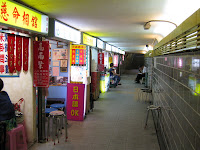I have been thinking about trash a lot lately - how much I generate, where it goes, what can be recycled, where it is stored...that sort of thing. Jesse and I have always lived in apartments, and I HATE taking the trash to the dumpster. I would rather wash 100 dishes than take out the trash. I would cram trash into the can rather than take it out and start new bag. It drives Jesse crazy. But, I am very lucky to have a very generous husband who regularly takes out the trash...so for me, trash has pretty much magically disappeared when it filled the can.
There are no dumpsters in Taipei. That would be wasted use of valuable space. (Another blog someday on use of space in Asian cities and vertical living) I live in a six floor apartment building but we do not have a dumpster. There is a schedule for trash collection, and you bring your trash down to the end of the street at the appropriate time and day. Sounds easy enough, right?
Kind of. First of all, I didn't know how to KNOW the trash man was here. Then I finally put two and two together and realized Taipei children do not have an inordinate desire for ice cream, but rather, the music playing each night that sounds kind of like an ice cream truck driving by is not an ice cream truck, but the trash truck!
Ok, so now that I know when the trash man comes, I need to gather up my trash and run down 180 steps to the front of the building and then get to the end of the street before he leaves. Hmm.
Or, I can place my trash bag in the general
area where the trash truck stops in the evening around the time he comes. But this is also where I walk every day. It just feels wrong, you know? I have been trained by the PSA's of the early 80's - litter in the living room and the crying Native American man? - NOT to litter. And to leave even a small bag of trash on the streetside seems wrong. Especially because I walk those streets every day.
Oh where, oh where is my magical American-size garbage can that takes itself to the dumpster when it is full and the magical dumpster-fairy who takes away the dumpster trash?
(Granted, if you live in Tucson, you know Tucsonans have only a 'theoretical' understanding that the trash goes inside the dumpster. They also think the area next to a dumpster is a good place to leave old furniture and grocery carts. Its part of the charm of the place. Perhaps I will blog another day about Jesse's awesome idea of the "urban-dog-sled race" which involved chaining all the abandoned shopping carts on our street together and harnessing them to Rosie...)Back to the topic of trash. Then there is the question of recycling. I use a lot of plastic water bottles because I don't have drinking water access in my apartment. So now I am collecting those to take to 7-11 because I am pretty sure they will recycle them there. The City of Seattle trained me really well to recycle.
However, all of this is birthday cake and bunnies compared to what I will mention next...Toilet tissue. Not to be too disgusting, but Taiwanese do not
flush toilet tissue; they
trash it. I am pretty sure it is related to the pipes and water usage and other urban planning/development issues. Thank you, American plumbing! You can't flush a Barbie doll down the toilet, but most of the time, your toilet tissue is OK.
Now, I am completely sold on the squat toilet thing - that is no problem for me. Ergonomically sound and less physical contact - I like it!
Except when it comes to bathroom trash. I mean, that trash is a SERIOUS biohazard. This is not one of those metal containers with a lid they have in the states for feminine waste - this is just a regular old trash bucket. I want to be as
far away from that bucket as possible and the squatting only brings me closer to it. (Consider the size of a public restroom stall) So, I have effectively avoided the "public Western toilet that you never actually sit on" problem, only to encounter the "squat toilet brings me into closer proximity to the poo-poo trash" problem.
Trash is a serious issue! This does not even take into account the piles of burning trash Jesse told me he saw in the slums in Argentina or the stories I have heard about the US putting big trash barges out into the ocean.
So, I have been forced to think more about my trash and I know it is good for me to do. The stuff in my 'magical trashcan' goes somewhere real. It has to take up space somewhere. And most likely it is piling up near someone poorer than me. They tell me we are eventually going to run out of space on this planet. I guess that means I should get used to trash being more complicated.



 a large variety of 'Pocky' - a cracker dipped in various flavors; mostly chocolate
a large variety of 'Pocky' - a cracker dipped in various flavors; mostly chocolate and, this being China, you also have the knock off 'Pocky' ...'Chocky'
and, this being China, you also have the knock off 'Pocky' ...'Chocky'



























